Items
Theme is exactly
Felice Picano (1944-)
-
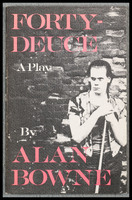 Forty-deuce : a play This dark play was first performed Off Off-Broadway in 1981 and gave Kevin Bacon (seen here on the cover) an early, award-winning role. The play’s title is a riff on both the tennis score and a junction at New York's 42nd Street known as ‘the Deuce’, where sex shops, porn cinemas and peep shows were clustered. The play, by Alan Bowne (1945-1989), depicts the death and exploitation of a young boy alongside a critique of commodity culture and was published by Felice Picano’s Sea Horse Press. Sea Horse Press was one of the Gay Presses of New York collective, which worked to increase the visibility of gay books.
Forty-deuce : a play This dark play was first performed Off Off-Broadway in 1981 and gave Kevin Bacon (seen here on the cover) an early, award-winning role. The play’s title is a riff on both the tennis score and a junction at New York's 42nd Street known as ‘the Deuce’, where sex shops, porn cinemas and peep shows were clustered. The play, by Alan Bowne (1945-1989), depicts the death and exploitation of a young boy alongside a critique of commodity culture and was published by Felice Picano’s Sea Horse Press. Sea Horse Press was one of the Gay Presses of New York collective, which worked to increase the visibility of gay books. -
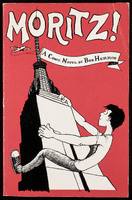 Moritz! : a comic novel A review of this novel described it as “a trashy book” but one that was nonetheless enjoyable thanks to its absurdist and silly humour. This satirical novel follows Jellico Moritz, a “well-endowed” young man, who travels from rural America to a new life and sexual awakening in New York City. The final chapter, entitled ‘Moritz Goes to a Garden Party’, was first published in ‘A True Likeness’ which was edited by Felice Picano. The book was published by Larry Mitchell’s Calamus Books which was one third of the Gay Presses of New York collective.
Moritz! : a comic novel A review of this novel described it as “a trashy book” but one that was nonetheless enjoyable thanks to its absurdist and silly humour. This satirical novel follows Jellico Moritz, a “well-endowed” young man, who travels from rural America to a new life and sexual awakening in New York City. The final chapter, entitled ‘Moritz Goes to a Garden Party’, was first published in ‘A True Likeness’ which was edited by Felice Picano. The book was published by Larry Mitchell’s Calamus Books which was one third of the Gay Presses of New York collective. -
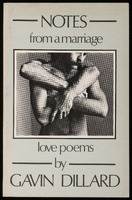 Notes from a marriage : love poems Since the mid-1970s, the creative output of Gavin Geoffrey Dillard (1954-) has encompassed many forms including poetry, songwriting and acting in pornographic films. This poetry collection, Dillard’s third, explores the emotional and sexual relationship between two young men, with some undertones of violence. It was published in New York by Felice Picano’s Sea Horse Press. In 1988, Australian gay rights activist Dennis Altman described Dillard as “the laureate of the sensual”, while Dillard’s poetry forms the basis of Clint Borzoni’s 2014 opera ‘When Adonis Calls’. Today, Dillard self-publishes books under his Gavin Dillard Poetry Library & Archive imprint and recently produced a new text and photographic edition of ‘Notes from a Marriage’.
Notes from a marriage : love poems Since the mid-1970s, the creative output of Gavin Geoffrey Dillard (1954-) has encompassed many forms including poetry, songwriting and acting in pornographic films. This poetry collection, Dillard’s third, explores the emotional and sexual relationship between two young men, with some undertones of violence. It was published in New York by Felice Picano’s Sea Horse Press. In 1988, Australian gay rights activist Dennis Altman described Dillard as “the laureate of the sensual”, while Dillard’s poetry forms the basis of Clint Borzoni’s 2014 opera ‘When Adonis Calls’. Today, Dillard self-publishes books under his Gavin Dillard Poetry Library & Archive imprint and recently produced a new text and photographic edition of ‘Notes from a Marriage’. -
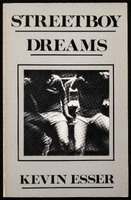 Streetboy dreams : a novel ‘Streetboy Dreams’ by Kevin Esser (1953-) was published by two out of the three Gay Presses of New York, who note the “controversial and divisive” nature of its subject matter. The novel details the relationship between Peter, a teacher in his mid-thirties, and teenage Gito. Unlike Bruce, the adult protagonist of Wallace Hamilton’s ‘Kevin’, Peter is not presented as a gay character, per se – the novel opens with the end of “another fling at heterosexuality”. Marketed at the time as “a different approach” to what was euphemistically known as “man/boy love”, it is hard to read the novel today as anything other than the story of a grooming – a glorification of unequal power dynamics and dubiously consensual sexual experience.
Streetboy dreams : a novel ‘Streetboy Dreams’ by Kevin Esser (1953-) was published by two out of the three Gay Presses of New York, who note the “controversial and divisive” nature of its subject matter. The novel details the relationship between Peter, a teacher in his mid-thirties, and teenage Gito. Unlike Bruce, the adult protagonist of Wallace Hamilton’s ‘Kevin’, Peter is not presented as a gay character, per se – the novel opens with the end of “another fling at heterosexuality”. Marketed at the time as “a different approach” to what was euphemistically known as “man/boy love”, it is hard to read the novel today as anything other than the story of a grooming – a glorification of unequal power dynamics and dubiously consensual sexual experience. -
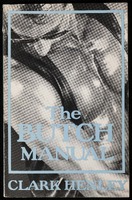 The butch manual : the current drag and how to do it A tongue-in-cheek manual for gay men on how to appear more ‘butch’, or stereotypically masculine, written in the style of a women’s magazine – complete with a problem page featuring Gertrude Stein as a fictional agony aunt. Butch men shun smiling, screaming and “misquoting Dorothy Parker” in favour of moustaches, yelling and talking dirty, according to author, model and artist Clark Henley (1950-1988). The book is undoubtedly influenced by the wildly popular contemporary humorous titles ‘The Official Preppy Handbook’ (1980) and ‘The Official Sloane Ranger Handbook’ (1982). Henley also drew the rare 1976 ‘Tails of the City’ ‘Alligator Oz’ map of San Francisco, a gay map of the city populated by cartoon alligators, and ‘A Butch Look at America’ (1982), in which the United States is represented by torn cut-off jeans over bare buttocks. Diagnosed HIV-positive in 1986, Henley died in San Francisco of AIDS-related causes in 1988, aged just 38.
The butch manual : the current drag and how to do it A tongue-in-cheek manual for gay men on how to appear more ‘butch’, or stereotypically masculine, written in the style of a women’s magazine – complete with a problem page featuring Gertrude Stein as a fictional agony aunt. Butch men shun smiling, screaming and “misquoting Dorothy Parker” in favour of moustaches, yelling and talking dirty, according to author, model and artist Clark Henley (1950-1988). The book is undoubtedly influenced by the wildly popular contemporary humorous titles ‘The Official Preppy Handbook’ (1980) and ‘The Official Sloane Ranger Handbook’ (1982). Henley also drew the rare 1976 ‘Tails of the City’ ‘Alligator Oz’ map of San Francisco, a gay map of the city populated by cartoon alligators, and ‘A Butch Look at America’ (1982), in which the United States is represented by torn cut-off jeans over bare buttocks. Diagnosed HIV-positive in 1986, Henley died in San Francisco of AIDS-related causes in 1988, aged just 38. -
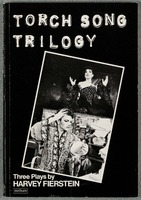 Torch song trilogy : three plays ‘Torch Song Trilogy’ has three acts titled ‘International Stud,’ ‘Fugue in a Nursery’ and ‘Widows and Children First!’ Each deals with a different phase in the life of Arnold Beckoff, a gay, Jewish drag queen and torch singer in 1970s and 1980s New York. Receiving criticism from some for upholding ‘family values’, for others, the trilogy’s exploration of gay marriage and adoption was radical during a time of conservative backlash. Harvey Fierstein (1954-) won a Tony Award for Best Play in 1983 as well as for Best Performance by a Leading Actor. First published in 1981 by the Gay Presses of New York, this edition was published in the UK to tie in with its West End premiere at Albery Theatre (now the Noël Coward Theatre) in 1985. Fierstein has since blazed a trail for queer representation on stage and screen.
Torch song trilogy : three plays ‘Torch Song Trilogy’ has three acts titled ‘International Stud,’ ‘Fugue in a Nursery’ and ‘Widows and Children First!’ Each deals with a different phase in the life of Arnold Beckoff, a gay, Jewish drag queen and torch singer in 1970s and 1980s New York. Receiving criticism from some for upholding ‘family values’, for others, the trilogy’s exploration of gay marriage and adoption was radical during a time of conservative backlash. Harvey Fierstein (1954-) won a Tony Award for Best Play in 1983 as well as for Best Performance by a Leading Actor. First published in 1981 by the Gay Presses of New York, this edition was published in the UK to tie in with its West End premiere at Albery Theatre (now the Noël Coward Theatre) in 1985. Fierstein has since blazed a trail for queer representation on stage and screen. -
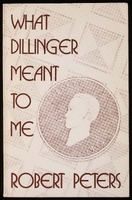 What Dillinger meant to me This poetry collection from Robert Peters (1924-2014), his eighteenth, contains a mix of new poems and some that were published in earlier books and little magazines, such as ‘The Berkeley Poetry Review’. This volume is autobiographical, focussing on the poet’s childhood, family and society in rural Wisconsin during the Great Depression of the 1930s. The American gangster John Dillinger was involved in a shootout in the nearby Little Bohemia Lodge – his image adorned the young Peters’s bedroom wall, and he appears throughout this collection. Peters’s burgeoning sexuality is explored in poems such as ‘Tommy McQuaker’, about a local gay man who defiantly “walked like a woman down Main Street”, inspiring both fear and desire. Published by the Sea Horse Press, the book is dedicated to Peters’s parents.
What Dillinger meant to me This poetry collection from Robert Peters (1924-2014), his eighteenth, contains a mix of new poems and some that were published in earlier books and little magazines, such as ‘The Berkeley Poetry Review’. This volume is autobiographical, focussing on the poet’s childhood, family and society in rural Wisconsin during the Great Depression of the 1930s. The American gangster John Dillinger was involved in a shootout in the nearby Little Bohemia Lodge – his image adorned the young Peters’s bedroom wall, and he appears throughout this collection. Peters’s burgeoning sexuality is explored in poems such as ‘Tommy McQuaker’, about a local gay man who defiantly “walked like a woman down Main Street”, inspiring both fear and desire. Published by the Sea Horse Press, the book is dedicated to Peters’s parents.
